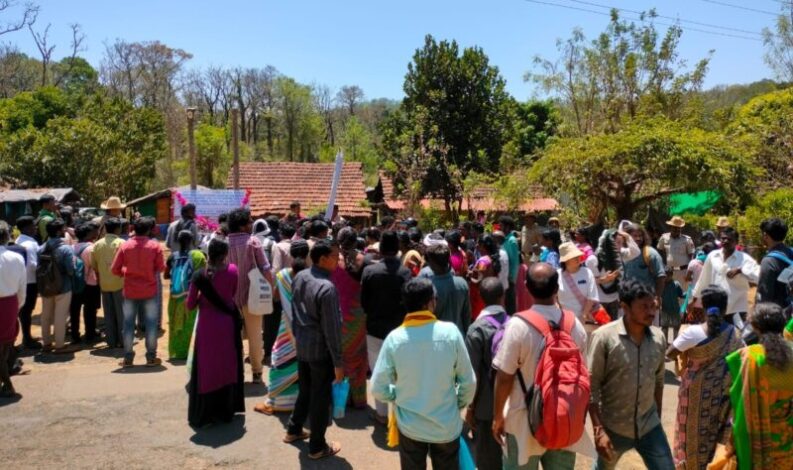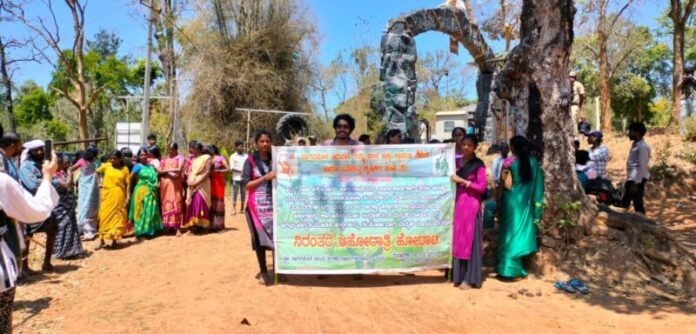Nagarhole: Last Wednesday, several indigenous communities across the country came together in Nagarhole and launched a week-long padayatra across the villages inside Nagarhole Tiger Reserve to protect their rights. The padyatra began on 15 March 2023 from Kumbarakatte village and reached the forest department office, Nagarhole Tiger reserve yesterday. The sit-in in front of the office will continue indefinitely. Some community leaders will also hold a two-day intercommunity dialogue and press conference at the Indian Social Institute, Bangalore from 22-23 March 2023.
The padyatra is being organised under the name of Community Network Against Protected Areas (CNAPA), a newly formed network of people’s movements and groups resisting the capitalist and neo-colonial conservation model adopted by the government, and foregrounding the idea of radical community ownership where forests, animals, and peoples equal. The network includes Adivasis who have been displaced or who face eviction due to conservation projects in Uttar Pradesh, Chhattisgarh, Arunachal Pradesh, Andhra Pradesh, Odisha, and Karnataka. Two important organisations leading the fight are Nagarhole Adivasi Jamapale Hakkusthapana Samiti and Budakata Krishikare Sangathan. Even after the padyatra is over, they will continue to be on indefinite protest until their rights are recognised.
In the past, the Nagarhole Tiger Reserve has seen several protests by Adivasi communities such as the Jenu Kuruba community, who in the face of forceful evictions and violence, demanded that the Forest Rights Act be implemented and that their ancestral rights to the forest be respected.

The extractive and neo-colonial nature of India’s conservation practices:
India’s conservation policy and practice are rooted in a “fortress conservation” model which involves creating Protected Areas (PAs) or exclusive human-free “wilderness” zones such as wildlife sanctuaries, national parks, and reserves. This model has a colonial and romanticised view of nature and propagates a false dichotomy between people and animals.
The declaration of Adivasi land as a PA is a violation of constitutional rights vested in Gram Sabhas and forest rights committees (FRCs). It is also a violation of the Panchayat (Extension to Scheduled Areas) Act or PESA, 1996 applicable in Schedule Areas.
When a region gets declared as a PA, thousands of Adivasi communities are evicted. The National Tiger Conservation Authority (NTCA) is supposed to offer a ‘relocation package’ consisting of cash compensation and housing, healthcare, and education infrastructure to displaced families. However, many families are evicted without receiving packages. Out of the 56,257 families that have been evicted since the inception of the tiger projects in 1972, 44,000 families have not received relocation packages. For those that have, the living conditions are appalling and many are forced into daily wage work at construction sites. Communities who live adjacent to PAs and need to access those forests for livelihood are also stopped from going in. Instead, PAs have become extremely militarised zones, resulting in local people being shot, implicated in false cases, beaten up and killed by park rangers like the Special Tiger Protection Force in Kaziranga(Assam), Nagarhole (Karnataka), Similipal (Odisha) and Sundarbans over the years. The Kaziranga National Park even has a “shoot-at-sight” policy.
35 Adivasis Arrested After Run-ins with the Forest Department
On the other hand, massive swathes of forested land in Tiger-bearing regions have been diverted toward mining operations. In fact, NTCA’s relocation programmes are financed from money that mining companies deposit with the government for conducting mining operations in forested areas. Tourism projects and other market-based programs such as eco-resorts and safari trails are also carried out within PAs without any care for the ecological impact. To appeal to tourists, eco-engineering practices are adopted and exotic species are imported from abroad, affecting local ecosystems. These projects are also responsible for the erosion of local people’s conservation ethos, knowledge systems, and customary resource management practices.
Any resistance by Adivasis and other forest-dwelling communities results in criminalisation and harassment by the forest department and the wildlife and forest conservation lobby (NGOs and bureaucracy). Many Adivasi/Tribal leaders have been slapped with false cases, coerced, tortured, and murdered. Adivasi/Tribal people are also made scapegoats in wildlife poaching cases to protect organised syndicates of poachers.
The Post-2020 Global Biodiversity Framework proposes to upscale PAs by 30% by 2030, which can only be seen as another move to erode Adivasi/Tribal rights in the name of biodiversity conservation.
Despite this, they continue to assert their rights and fight evictions. The two-day intercommunity dialogue at the Indian Social Institute, Bangalore will continue this conversation on the global capitalist and neo-colonial conservation model. The CNAPA challenges the cartel of forest departments, wildlife NGOs, conservationists, and corporations by exposing their collaborative exploitation of various natural resources and black-marketing of wildlife parts. undermining communities’ knowledge and agency in the practice of conservation embedded in co-existence. The meeting is like a coming together of communities and people to articulate their voices against the destructive impacts of conservation and to chart working strategies for grounding the idea of radical community ownership of forests and commons, including wildlife.



